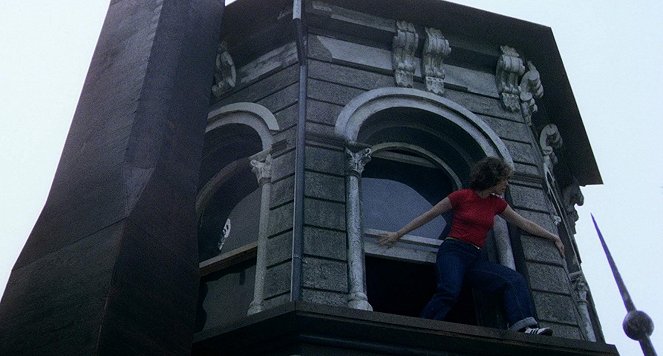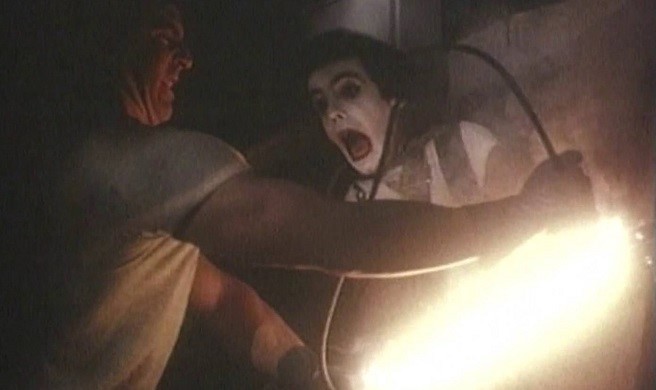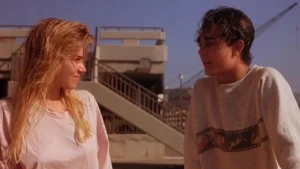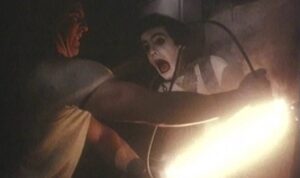– The Nesting is the movie for the weekend. In this section every Saturday or Sunday Celluloid Dimension picks a movie for the weekend. The selections are preferably underrated movies or neglected movies that we think should get more attention. Have fun with these recommendations. –
Directed by Armand Weston
Written by Daria Price and Armand Weston
Starring:
- Robin Groves as Lauren Cochran
- Christopher Loomis as Mark Felton
- Michael David Lally as Daniel Griffith
- John Carradine as Col. LeBrun
- Gloria Grahame as Florinda Costello
- Bill Rowley as Frank Beasley
- David Tabor as Abner Welles
- Patrick Farrelly as Dr. Webb
- Bobo Lewis as Catherine Beasley
Rating: ![]()
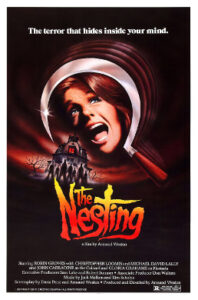 In the dim corridors of the haunted house genre, there are films that claw their way toward reinvention—and then there are those that recede into the shadows, content to echo old, familiar forms. The Nesting belongs gloriously to the latter. It does not protest its inheritance, nor does it sneer at its conventions. Rather, it clutches its spectral lineage like a beloved curse, and in doing so, emerges with a strange and solemn dignity. Here is a ghost story interlaced with agoraphobia and déjà vu, memory and disorientation, told not with irony but with the sincerity of whispered folklore.
In the dim corridors of the haunted house genre, there are films that claw their way toward reinvention—and then there are those that recede into the shadows, content to echo old, familiar forms. The Nesting belongs gloriously to the latter. It does not protest its inheritance, nor does it sneer at its conventions. Rather, it clutches its spectral lineage like a beloved curse, and in doing so, emerges with a strange and solemn dignity. Here is a ghost story interlaced with agoraphobia and déjà vu, memory and disorientation, told not with irony but with the sincerity of whispered folklore.
The structure mirrors the fluid incoherence of a hypnagogic vision: a fragile novelist, paralyzed by her fear of open spaces and haunted by indistinct recollections, flees the steel chaos of NYC for the quiet menace of a Victorian house upstate—a structure of peculiar design, octagonal and enclosing, like a mausoleum fashioned by memory. There, the real begins to dissolve. Robin Groves inhabits this tormented role with a low-burning anguish, embodying a woman who does not simply encounter a ghost, but becomes the site of haunting itself. In the echo of every stair creak and spectral murmur, her own psychic fracture deepens.
There is something mournfully elegant in watching Gloria Grahame drift through these haunted frames, spectral even before she becomes a literal ghost. It was her final role—an epitaph in celluloid—and her presence here seems pulled from some other register, half glamor, half grave. Her appearances do not so much disrupt the narrative as deepen its atmosphere, as if the film is less interested in linear storytelling than in summoning a mood of encroaching dread.
It is no small astonishment that Armand Weston, emerging from the lurid dens of XXX filmmaking, approaches this spectral tale not with camp or cynicism, but with a somber, near-reverent touch. Where others might have leaned into kitsch or overcorrection, Weston instead works with solemn conviction. He seems to know that the ghost story, like pornography, deals in ritual and repetition, in arousal and repression. Partnering with João Fernandes—perhaps the most visually sophisticated cinematographer to emerge from adult cinema—Weston conjures a realm bathed in dim luminance and skewed perspectives. The film dances along the fine line between exploitation and art, and in that liminal space, it finds moments of strange transcendence.
Yes, The Nesting borrows liberally from the canon—its structure is stitched from the bones of better-known predecessors—but its pacing, so often maligned, grants it an atmosphere of fatalistic drift. Violence erupts in brief slasher spasms, but the dominant mode is oneiric and mournful. What emerges is not a puzzle to be solved but a wound to be exposed. As the protagonist’s connection with the house intensifies, the environment itself seems to bleed hostility, particularly of a masculine kind. She is not simply at risk—she is being trespassed upon, by both the living and the dead.
Still, the film is not without its ghosts of incompletion. For all its visual beauty and thematic resonance, Weston remains more interested in surfaces than in souls. The film’s architecture—the literal house and its symbolic weight—receives greater scrutiny than its characters. The final revelation, bleak and tragic, carries thematic heft, but lands without the necessary intimacy. We understand the tragedy, but we do not feel it in the gut. There is a distance here, a refusal to fully enter the emotional interior of its protagonist.
And yet, for all its restraint, The Nesting lingers. A supernatural shocker with aesthetic yearning, a ghost yarn that dares to be quiet, melancholic, and unpretentiously artful. This isn’t your typical scream-and-run phantasmagoria; it’s a slow burn soaked in rancour and lugubrious mood, wearing its clichés like battle scars rather than shameful secrets. Sure, it won’t topple the genre greats from their thrones, but it earns its place in the dustier corners of horror lore—a lo-fi Gothic wail rattling through dust-choked halls and smoky shadows, where art and exploitation blur into a deliciously eerie mix.
